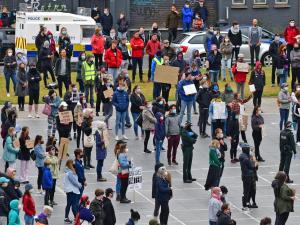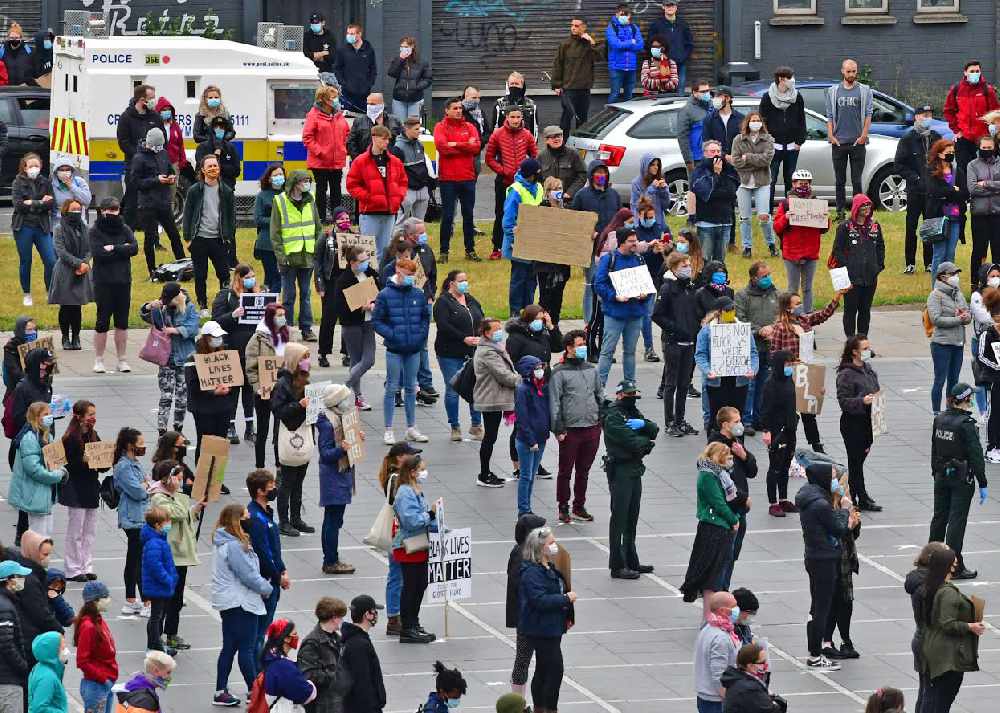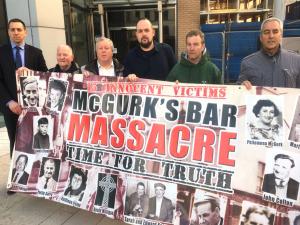
By David Young, PA
Concerns around discriminatory police handling of Black Lives Matter protests in Northern Ireland are justified, a watchdog has said.
Northern Ireland’s Police Ombudsman Marie Anderson said confidence in the Police Service of Northern Ireland among some within the Black, Asian and Minority Ethnic communities in the region had been severely damaged by the incidents.
In response to the report, PSNI chief constable Simon Byrne said he was sorry that relations with those minority communities had been damaged and vowed to “put things right”.
The PSNI faced criticism in the summer after handing out Covid regulation breach fine to participants in the protests. They faced scrutiny why penalties had been issued at those events while other gatherings in apparent breach of regulations did not witness similar police action.
Patrick Corrigan, Northern Ireland Programme Director of Amnesty International, said the report must lead to action.
“This is a deeply critical report into how the PSNI went about policing this summer’s Black Lives Matter protests," he said.
"The Police Ombudsman has concluded that the PSNI acted in an unfair and discriminatory manner, paid mere ‘lip service’ to human rights, and found its use of the Serious Crime Act against peaceful protestors to be ‘entirely disproportionate’.
"The police failed to uphold people’s rights to freedom of expression, protest and peaceful assembly and did so in a way which discriminated against anti-racism campaigners.
“It is unfortunate that it has taken two deeply critical reports, firstly from the Northern Ireland Policing Board and now from the Police Ombudsman, for the Chief Constable to apologise for what were obvious and significant failings from the start."
He concluded: “These investigations must lead to a fundamental reassessment of how the PSNI approaches the right to protest and to the necessary work of rebuilding their badly damaged relationship with Northern Ireland’s Black and Minority Ethnic communities.”

The Ombudsman specifically examined contrasting police approaches at Black Lives Matters protests in Belfast and Londonderry on June 6, when fines were handed out, and a Protect our Monuments counter-protest in Belfast a week later – an event that saw no penalties issued.
The protests and counter demonstration were similar to events held around the world following the death in May of George Floyd, a black man who died while being restrained by police in the US city of Minneapolis.
In a 90-page report, Mrs Anderson said claims PSNI actions amounted to unfairness and discrimination were justified.
However, she said she believed this was not intentional and not based on race or ethnicity.
The Ombudsman said the situation had arisen due to a “failure” by police to fully understand their human rights obligations.
Mrs Anderson has made a number of recommendations which included that in future police consider adopting a human rights-based approach to the policing of protests, which would involve balancing competing rights and risks.
She also said police should consider redress for those singled out for fines.
She said: “Those protesters who sought to exercise their rights in support of the Black Lives Matter on 6th June were unfairly treated and this gave rise to a perception of discrimination in the public’s mind,” said the ombudsman.
“I believe this perception is justified given that the policing practices of 13th June were substantially different and did not reflect the need to treat protesters equally and in a manner which addressed human rights.”
Last month, the PSNI’s oversight body – the Policing Board – questioned whether the organisation’s approach to the Black Lives Matter protests was “unlawful” and if the issuing of fines to participants took due consideration of their right to protest.
In response to the Ombudsman’s report, chief constable Mr Byrne said: “The report from the Police Ombudsman provides an important commentary about pressures arising from the policing operation on two days in June this year in unique and novel circumstances, using policing powers derived from emergency public health regulations.
“From the outset, both personally and as an organisation, we were alive to the widespread revulsion at the events that led to the death of George Floyd in the USA.
“We tried our best to respect the public health requirements of the Northern Ireland Executive to save lives and at the same time deal with public outcry triggered by this awful death.
“We operated within the legal framework available to us at the time, but the Ombudsman is clear that whilst unintentional, we got that balance procedurally wrong.
“As is only prudent and as the Ombudsman herself says in her comprehensive report, we will now seek to embrace the lessons learned and carefully consider her specific recommendations about policy, practice and procedural fairness.”
Mr Byrne noted that he had already moved to set up a new community relations taskforce within the PSNI.
“We will have to review this report in concert with the earlier report from the Policing Board and I will report our next steps further in January,” he added.
“However, it is clear to me that some members of the Black and Minority Ethnic Community have been frustrated, angry and upset by our policing response and our relationship with them has suffered. For that I am sorry, and I am determined in that regard to put things right.”


 Swann refuses to rule out resigning if budget is not changed
Swann refuses to rule out resigning if budget is not changed
 Fresh inquests ordered into deaths of 15 killed in McGurk’s bomb blast
Fresh inquests ordered into deaths of 15 killed in McGurk’s bomb blast
 Trial ends after man accused of murder of young showjumper is found dead
Trial ends after man accused of murder of young showjumper is found dead
 A brief hearing and chaotic scenes as Donaldson makes first court appearance
A brief hearing and chaotic scenes as Donaldson makes first court appearance